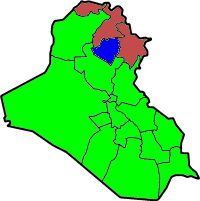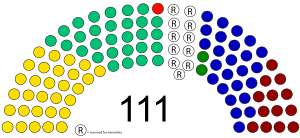Iraq is a federal parliamentary representative democratic republic. It is a multi-party system whereby the executive power is exercised by the Prime Minister of the Council of Ministers as the head of government, the President of Iraq as the head of state, and legislative power is vested in the Council of Representatives.

The National Iraqi Alliance, also known as the Watani List, was an Iraqi electoral coalition that contested the 2010 Iraqi legislative election. The Alliance was mainly composed of Shi'a Islamist parties. The alliance was created by the Supreme Council for Islamic Revolution in Iraq to contest in the January 2005 and December 2005 under the name United Iraqi Alliance, when it included all Iraq's major Shi'a parties. The United Iraqi Alliance won both those of elections however later fell apart after several major parties left the alliance due to disputes with Prime Minister Nouri al-Maliki and the Supreme Council.
The Democratic Patriotic Alliance of Kurdistan (DPAK) sometimes referred to simply as the Kurdistan Alliance (KA) is the name of the electoral coalition first presented as a united Kurdish list in the January 2005 election in Iraq. Elections were held simultaneously for the assembly of Kurdistan Region. The Alliance represents a coalition of the two main Kurdish parties, the Kurdistan Democratic Party and the Patriotic Union of Kurdistan

The Council of Representatives is the de facto unicameral legislature of the Republic of Iraq. According to the Constitution of Iraq, it is the lower house of the bicameral legislature of the country. As of 2020, it comprises 329 seats and meets in Baghdad inside the Green Zone.

The Iraqi Turkmen Front is a political movement representing the Iraqi Turkmen people. It was founded on April 5, 1995 as a coalition of several Turkmen parties operating within the framework of Iraq's unity. The party aims for the Turkmen community to have greater political involvement, increased recognition and more rights.

Kurdistan Region (KRI) is a semi-autonomous federal region of the Republic of Iraq. It comprises four Kurdish-majority governorates of Arab-majority Iraq: Erbil Governorate, Sulaymaniyah Governorate, Duhok Governorate, and Halabja Governorate. It is located in northern Iraq, which shares borders with Iran to the east, Turkey to the north, and Syria to the west.

The Kirkuk status referendum was the Kirkuk part of a planned plebiscite to decide whether the disputed territories of Northern Iraq should become part of the Kurdistan Region. The referendum was initially planned for 15 November 2007, but was repeatedly delayed and ultimately never took place.

The Kurdistan Regional Parliament, also known as Kurdistan Parliament - Iraq, or simply Perleman, is the parliament of the Kurdistan Region in Iraq. It is made up of representatives from the various parties, lists or slates that are elected every four years by the inhabitants of Kurdistan Region, which is currently governed by the Kurdistan Regional Government. In 2009 an amendment was applied to the Kurdistan Election Law of the year 1992, changing the name of the body to Kurdish Parliament from its previous name: the Kurdish National Assembly.

Governorate or provincial elections were held in Iraq on 31 January 2009, to replace the local councils in fourteen of the eighteen governorates of Iraq that were elected in the 2005 Iraqi governorate elections. 14,431 candidates, including 3,912 women, contested 440 seats. The candidates came from over 400 parties, 75% of which were newly formed.

Parliamentary elections were held in Iraq on 7 March 2010. The elections decided the 325 members of the Council of Representatives who would elect the prime minister and president. The elections resulted in a partial victory for the Iraqi National Movement, led by former Interim Prime Minister Ayad Allawi, which won 91 seats, making it the largest alliance in the Council. The State of Law Coalition, led by incumbent Prime Minister Nouri Al-Maliki, was the second largest grouping with 89 seats.

The al-Hadba party is a political party formed to contest the 2009 Iraqi governorate elections in Ninawa province. It is mostly made up of Sunni Arabs. Its leading member Atheel al-Nujaifi is brother of Osama al-Nujaifi who is part of the Iraqi National List led by former Iraqi Prime Minister, Ayad Allawi. It has also been reported that members of the coalition have the backing of Shia Prime Minister Nouri al-Maliki.

Assyrian politics in Iraq have been taking many different turns since the US invasion of the country in 2003. Today, there are many different Assyrian political parties in Iraq. The main Assyrian party that came out from the 2005 elections was the Assyrian Democratic Movement. However, Sarkis Aghajan began to challenge its power beginning in 2006 with the opening of Ishtar TV and the KDP-affiliated Chaldean Syriac Assyrian Popular Council.

The Gorran Movement or just Gorran (Change) is a Kurdish political party in the Kurdistan Region of Iraq. The party is led by Dana Ahmed Majid, it was formerly under the leadership of Omar Said Ali, and was founded in 2009 by Nawshirwan Mustafa. Gorran is the sixth largest party in the Kurdistan Region, having lost almost all of its voters (95%) since its foundation, and is now no longer represented in the Iraqi parliament.

Governorate or provincial elections were held in Kirkuk Governorate in 2009 to replace the governorate council elected in the 2005 Iraqi governorate elections. The remaining governorates outside Iraqi Kurdistan held elections on 31 January 2009.

The Kurdistan Region presidential elections of 2009 took place on 25 July 2009, coinciding with the 2009 Kurdistan Region parliamentary election. A total of 2.5 million citizens of Kurdistan Region were eligible to vote in the parliamentary and presidential elections. It is the first time that the President of Kurdistan Region was chosen directly through popular votes. People currently living outside Kurdistan Region were not allowed to vote.

The Kurdistan List, also known as the Kurdistan Alliance or the Brotherhood List, is the name of the electoral coalition that ran in the Kurdistan Regional Government parliamentary elections in Iraqi Kurdistan in July 2009. The Kurdistan List represented a coalition of the two main ruling parties in Iraqi Kurdistan, namely the Kurdistan Democratic Party and the Patriotic Union of Kurdistan. It is the successor of the Democratic Patriotic Alliance of Kurdistan.
This article concerns the formation process of the Al Maliki I Government of Iraq in the aftermath of the Iraq National Assembly being elected on December 15, 2005. Due to disputes over alleged vote-rigging the results of the election were only certified by the Independent Electoral Commission of Iraq on February 10, 2006.

Parliamentary elections were held in the Kurdistan Region of Iraq on 21 September 2013. They were the fourth parliamentary elections in Kurdistan Region since 1992. The candidates were competing for a total of 111 seats out of which 11 seats were reserved for minorities. According to the Iraqi High Electoral Commission, there were 366 female and 736 male candidates for the elections. A total of 2,653,743 people were eligible to vote throughout the three provinces of Erbil, Sulaymaniyah and Dohuk of which 74% cast their ballots.

Parliamentary elections took place in Kurdistan Region on 30 September 2018 to elect Parliament. The election came a year after a failed bid for independence and left the ruling Kurdistan Democratic Party (KDP) with 45 seats, that positioning it to lead the next regional government. Announcement of the results was delayed for three weeks. The KDP's historic rival and junior coalition partner in government, the Patriotic Union of Kurdistan (PUK), was in second place with 21 seats. The results suggest that Masoud Barzani’s KDP will take a dominant position in Kurdish politics.
The Kurdistani Coalition or Kurdistan Alliance Party is an electoral coalition founded by the major Kurdish parties of Kurdistan Region to run in the next Iraqi governorate elections. The coalition will run in the disputed areas between Iraq and Kurdistan Region and Baghdad Governorate to consolidate Kurdish votes. A total of 96 candidates will run as part of the coalition.





















